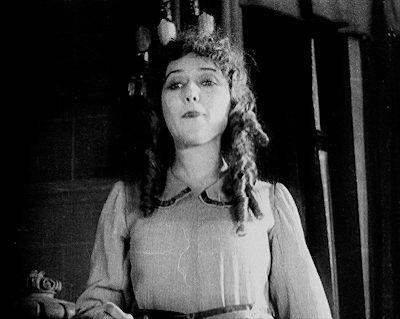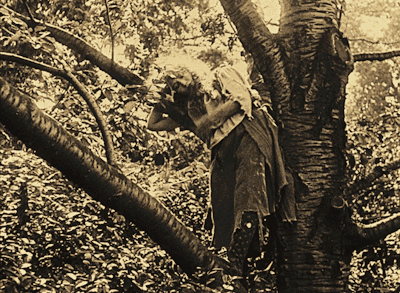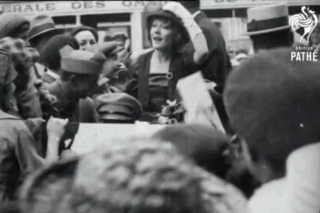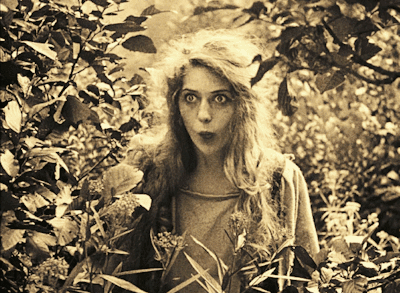#ClassicFilmReading: Mary Pickford: From Here to Hollywood by Scott Eyman
If you're looking for a portrait of the silent years of Hollywood, this might be it.
This is my second entry for this summer's Classic Film Reading Challenge hosted by Raquel of Out of the Past. You can still enter yourself, and read everyone's entries using the hashtag #classicfilmreading on social media!
Earlier this year I watched a slew of Marion Davies silents when she was TCM's Star of the Month and determined that I should watch more, but then life got in the way and here we are! Three of the women I'm reading about for this summer's challenge were silent stars and all made the transition to sound with varying affects (stay tuned for reviews of Lillian Gish's autobiography and a biography of Gloria Swanson).
Silent stars are fascinating to me because they built Hollywood and were relics as soon as sound took over. Some transitioned seamlessly, like Joan Crawford, others... not so much.
In the case of Mary Pickford, she was both a trailblazer and a relic at the same time. Even as she was globally dominating the film world she was anachronistic; playing only young girls and boys, shaving years off her age, lying about her marital status so as not to lose fans.
And it goes back to childhood for her: after her father died in a freak accident, she became the family's breadwinner as a stage actress. Forced to become the head of the family while cashing in on her youth must've done a number on her.
A lot of Scott Eyman's biography focuses on how Mary Pickford became a titan and then nearly totally forgotten, aside from the name. Because who except for the film buffs remember Mary Pickford? She once dominated the film industry and the world—she hosted royalty, was treated like royalty, met royalty while traveling the world—but now her name seems to be lost against other actresses of the time.
There's a lot to appreciate about Mary Pickford.
This woman could demand Oscars—competitive and honorary—and get them, even if the competitive one is nearly-universally considered the first lifetime achievement award ever handed out by the Academy (it's true, go watch Coquette and tell me she deserved it). The lifetime award in 1976 came only because her long-simmering hatred and jealousy of Charlie Chaplin came to a head and she demanded one after he received it.
She had great business acumen as well. I'll admit that a lot of the facts and figures went over my head, but learning how astute she was in the creation of United Artists, keeping it afloat, and finally selling when the time was right, showed that she wasn't just a pretty face in front of the camera. She also banked her salary and lived on her expense accounts in the '20s.
She knew her worth and negotiated until she got it. Some people loved her for it, others not so much (cough D.W. Griffith cough).
And she was quite prescient about her fame and the film industry as a whole. In 1923, she was quoted talking about silent films and advancing technology, saying, "The [movies] we are doing now will be hopelessly antiquated."
But who could she have been if she hadn't pigeonholed herself into the Pollyanna with the long curls? If she hadn't clung to that persona her entire film career? Eyman often wonders what the 'psychic cost' of acting this way did to Mary and you can't help but wonder.
In 1925, she asked the readers of Photoplay for ideas on new films. All the suggestions were things like Cinderella, Anne of Green Gables, Heidi or Alice in Wonderland. If she'd allowed herself to grow up, to showcase herself as a woman, to have cut her curls earlier than 1928 (only after her controlling mother passed away), could she have become another Norma Shearer or Joan Crawford?
The prescience comes into play again later in the biography, when Eyman notes that Mary never played her old films in her later years (in fact, she got rid of a lot of them so that she could get the money for silver in the nitrate. Alas!). She was quoted as saying, "I'm not going to ask the Mary of yesteryear to compete with the actresses of today. I look upon her as my daughter.. She worked hard that I might retire and live in security, and I have to protect her memory."
Mary knew she was a relic while at the same time recognizing how she made the industry. She was in many ways the first film star. Biograph, her first studio, didn't want individual publicity for its stars because they figured the actors would want raises. So they insisted on anonymity. Mary was just an unnamed star in North America, but abroad, in the UK where they insisted on names, she was given the name Dorothy Nicholson.
Who could she have been if she hadn't pigeonholed herself into the little girl curls and clung to the persona of Mary Pickford? Eyman writes, "The older she got the less like Little Mary she became. Conversely, the less like Little Mary she became, the more fervently her public willed the fiction that Mary Pickford stay sixteen...forever."
There's also a lot to hate about Mary Pickford.
She could be controlling with her family. Even though she helped her siblings out, you get the sense she never let them forget that she was the breadwinner. She controlled her visitors to Pickfair and sometimes just... didn't visit with them while they were at the estate.
The main thing, though? Her politics.
I wish I'd saved the tweet, I literally just scrolled by it a few minutes before I began writing this, but it was along the lines of 'when a silent film biography motors along until the mid-'30s and then skips until 1946 and the biographer writes, nothing much really happened between these years you know exactly what it means...'
By all accounts, her career was over by the mid-'30s, but Mary had been vocally supportive of both Mussolini and Hitler before the Second World War began. Eyman doesn't dive into how she felt during the war. You can Google it to see that her politics changed, where they were concerned. She also ratted on Charlie Chaplin in the '50s (Eyman notes that she was also being investigated for earlier statements) and seemed to delight in telling the FBI agents about his transgressions.
She became an alcoholic, in the family tradition, after her screen career ended. It was an open secret in Hollywood, and everyone knew that you had to get your business done by noon, else she'd be out for the rest of the day.
And her adopted children with third husband Charles "Buddy" Rogers was estranged, at best. Roxanne and Ronald left Pickfair as soon as they could, and Eyman notes that Mary's Victorian ideals of childrearing put her at odds with her children.
Mary Pickford is fascinating in the sense that she seems to belong mostly to the silent era but you can't look at fame today without considering her in context.
In terms of taking her career into her own hands, of rising above the gossip while also contributing to it, for the storied love affair (I know I haven't touched upon much about Mary and Douglas Fairbanks Sr., but honestly...they were very boring), in having it all and losing it all, in becoming a treasured memory of yesteryears, she's just like every other major actress who's come along.
She didn't do it backwards and in high heels, like Ginger, but she blazed a trail nonetheless.





This sounds like such an interesting book! Amazingly, I realized that I have never seen a Mary Pickford movie, even though she's so well-known. The closest I came was Coquette -- I have it in my collection, but I haven't yet been able to make it through it. I would really like to see some of them, though. Your review of the book makes me want to check some out!
ReplyDeleteI didn't know that Eyman had written about Mary Pickford. Lots of great information here. Sounds like she had a rollercoaster of a life.
ReplyDelete